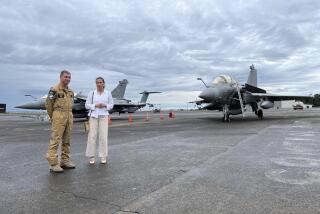France Won’t Put Missiles Near German Border
- Share via
PARIS — Seeking to relieve German concerns about the intentions of France’s independent nuclear forces, President Francois Mitterrand said Wednesday that the French army will not deploy its new generation of short-range Hades missiles near the German border.
Conceived during the Cold War, the Hades was designed to reach Soviet troop concentrations in the former East Germany.
German officials were alarmed by reports that the French intended to equip a brigade with the powerful nuclear weapons, despite the reunification of Germany and the announced withdrawal of Soviet troops from the region. German disarmament expert Hermann Scheer called the weapons a “European anachronism.” Senior aides to Chancellor Helmut Kohl expressed their uneasiness with the French plans.
In a nationally televised press conference Wednesday, Mitterrand announced that France will limit the number of Hades missiles to 30--compared to the original order of 120--and that they will be stockpiled but not deployed.
“Our German friends can be assured that we do not have the intention of harming the interests or the life of the Germans,” he said.
The announcement reflected a general reduction of France’s nuclear forces in the post-Cold War era. In July, the French government announced the termination of a $5-billion program to develop a new long-range nuclear missile, the S-45, to be based in underground silos in the south of France. On Sept. 1, French military forces eliminated the airborne AN-52 nuclear bombs from their arsenal. On Wednesday, Mitterrand announced that an older generation of short-range Pluton missiles will be phased out as scheduled in 1993.
But, according to the International Institute of Strategic Studies in London, the French have at least 96 multi-warhead nuclear missiles on six submarines and 18 long-range missiles in silos in southern France.
The independent French nuclear force, the force de frappe , dates to 1966, when President Charles de Gaulle withdrew his forces from the central NATO command. Striving to establish France, still struggling after its World War II defeat and occupation by Germany, as an independent power, De Gaulle irritated Western allies by claiming that his nuclear forces were prepared to fire in any direction, east or west.
Mitterrand, who this week surpassed De Gaulle as the longest serving French leader of this century, called for a conference of France, Britain, the Soviet Union and the United States to discuss their nuclear arsenals in the rapidly evolving European political climate.
In a typically Gaullist-style press conference--half news conference and half royal audience in a gilded ballroom of the Elysee Palace--Mitterrand, 74, spent much of the time defending his international policies and embattled Prime Minister Edith Cresson.
After the attempted coup in the Soviet Union, Mitterrand has been criticized for a television appearance in which he referred to the plotters as “the new leaders” of the Soviet Union and giving little hope for the return of President Mikhail S. Gorbachev.
Bristling when asked about his “late” condemnation of the coup, Mitterrand initially refused to talk about it, then termed the criticism a “false interpretation.”
Regarding Cresson, Mitterrand said he is “very content” with having picked her for the job, despite her consistently low rating in public opinion polls. Despite widespread rumors, he said he has no intention of replacing her with another Socialist Party politician, European Commission President Jacques Delors.
It was only the sixth press conference in 10 years for Mitterrand, but he demonstrated his acute political timing by calling it at the same time as a big showcase meeting of right-wing political leaders.
More to Read
Sign up for Essential California
The most important California stories and recommendations in your inbox every morning.
You may occasionally receive promotional content from the Los Angeles Times.













